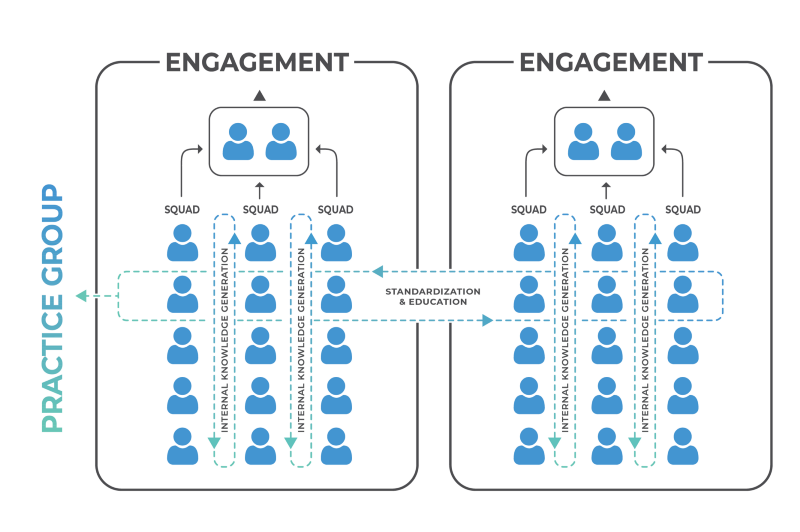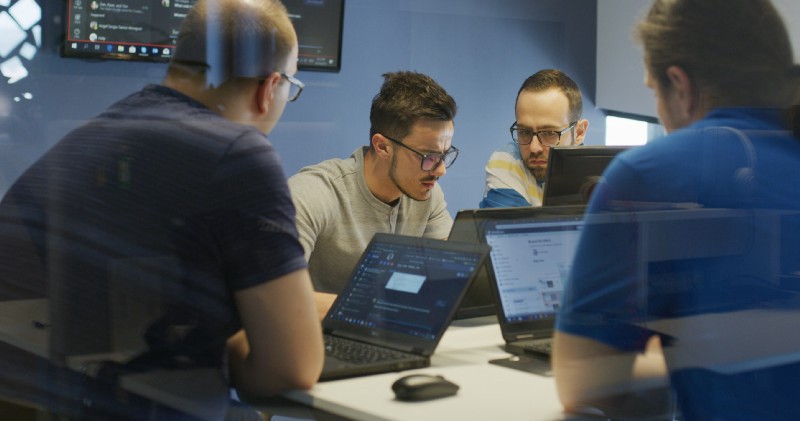Recoding the Matrix: How Maestral Leveraged a Traditional Structure to Develop a New Approach to Learning”, authored by Maestral s COO, Frank Torres, drew a sensible analogy between Maestral s Practice Groups (PGs) and Chapters and Guilds of Spotify. In this article, PGs were defined as follows:
Practice Groups are communities of employees who share the same role-defining competencies and wish to develop them further through knowledge sharing and research.
Since the publish date, the post has inspired curiosity and raised questions about how the PGs generally compare to classical departments as organizational units.
This article, apart from organizational aspects, aims to address PGs’ technical perspectives too, so that readers can get clearer insights into what PGs stand for and how they fit into building and sharing knowledge at Maestral.
Practice Groups Overview
Staying close to the Spotify comparison, Maestral Practice Groups represent a unique intersection between Chapters and Guilds. Like Chapters, PGs are formed around shared competencies, and like Guilds, they are fully open to all employees.
What really separates PGs from classical departments in organizational and technical terms?
Google Dictionary (Oxford Languages) defines a department as
A division of a large organization such as a government, university, or business, dealing with a specific area of activity.
Although Practice Groups resemble classical departments in some respects, a high degree of flexibility and ad-hoc ephemeral nature are the key differentiators that make us agile and competitive as an organization in every aspect.
Whatever their form, size, function, or established processes, departments still represent traditional, conservative organizational structures.
As such, departments suit well any administration, they recall and refer to the traditional leadership styles, rigid protocols of communication and decision making, i.e., the traditional leadership styles dating back to the “industrial era“. Overall, they are characterized by inflexible communication channels, the sluggish pace of delivery, and often unnecessarily sizeable hierarchies too.
It is little to say that exactly those characteristics bring avail and frustration to many IT organizations that want to stay competitive in the ever-changing tech markets. They cry for organizational changes and re-structuring. Maestral sympathized from the early days and wanted to build a faster-moving, and continuous flow of relevant pool of knowledge potential available in a lickety-split, right here and now- PGs were established.
Maestral Practice Groups Characteristics and Activities
Maestral continuously explores specific tech-related topics and areas, and with PGs, it is possible to generate and share the knowledge within the company. Depending on the specific topic/area, PGs may be either short/long term groups, small, medium, or large multi-functional teams.
On that account, the organizational style dubbed Practice Groups was established, serving us as mini hubs of excellence not as a substitute for classical departments, but rather as an innovative form of teams organization.
PGs are flexible, independent, cross-functional, and specific technology (or non-technology) interest groups.
What makes PGs unique is their capacity to be assembled on an ad-hoc basis, do the work, and disband them, once the goals and objectives are reached.
Research, certification (part of the Technology Partnerships initiative), Learning Path design, (part of the Professional Development Plan initiative), progress monitoring meetups, reporting, and monthly newsletters cover the range of main activities aiming at continuous education of people and overall standardization of business processes.
Each PG is led by a Lead, has one or multiple Advisors, with as many members, goals, and objectives as needed. PG Leads are responsible for planning, organizing, and steering various annual and quarterly activities.
PG Advisors assist Leads, support PG members, and the overall organization of groups and activities.
Employees take part (membership) in at least one Practice Group, but depending on their interests and preferences, they can join other Practice Groups too. (Employees can leave groups as well, in case they show no more interest.)
Continuous education is a cornerstone of Maestral s growth, and only through PGs, it is available to everyone in the organization. Be it days or week-long workshops, weekly Lunch & Learn sessions (some sessions being open to the public, too), or events with external guests and lecturers, the schedule is available through the public PG calendar. In addition to the calendar, timely announcements precede each session, so everyone is informed about the events.
Maestral s primary PGs are:
- Product & Project Management
- Design (UI/UX)
- Backend
- Frontend
- Mobile
- Data Science & Analytics
- Quality Assurance
- DevOps
- Security
There are also certain subgroups dubbed “secondary” on account of being organized around more specific topics and areas. For example, Backend PG has several subgroups organized around programming languages such as C#, Java, Rust, and GoLang, while Ruby disbanded because of the low market demand. On the other hand, subgroups such as SQL and Python represent the intersection of interests of both Backend and Data Science & Analytics PGs. Some of the disbanded PGs are also Blockchain and IoT (Internet of Things) but only temporarily.
PGs set the foundation for capability development at Maestral, and as such, they enable organic growth and expansion of knowledge and skills within the organization. Maestral has found a way to battle-test and optimize its approaches, overcome obstacles, and converge applying various product and software development methodologies in a way that best fits both specific, domestic needs and international market demands.


